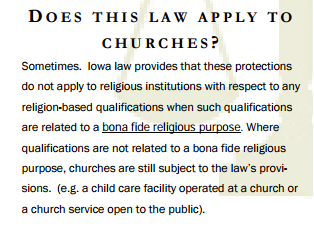On July 5, the Alliance Defending Freedom law firm posted an alert which inflamed religious conservatives with worries that the sky was truly falling in Iowa. Here is the opening two paragraphs:
DES MOINES, Iowa – Alliance Defending Freedom attorneys representing an Iowa church filed a federal lawsuit Monday against members of the Iowa Civil Rights Commission, among others, to stop the government from censoring the church’s teaching on biblical sexuality and from forcing the church to open its restrooms and showers to members of the opposite sex.
The commission is interpreting a state law to ban churches from expressing their views on human sexuality if they would “directly or indirectly” make “persons of any particular…gender identity” feel “unwelcome” in conjunction with church services, events, and other religious activities. The speech ban could be used to gag churches from making any public comments—including from the pulpit—that could be viewed as unwelcome to persons who do not identify with their biological sex. This is because the commission says the law applies to churches during any activity that the commission deems to not have a “bona fide religious purpose.” Examples the commission gave are “a child care facility operated at a church or a church service open to the public,” which encompasses most events that churches hold.
Note the active language: the lawsuit was filed “to stop the government from censoring the church’s teaching…and from forcing the church to open its restrooms…to members of the opposite sex” as if the government was actively censoring religious speech and forcing churches to open restrooms. In second paragraph, ADF wrote that “the commission is interpreting a state law to ban churches” as if the commission had just developed this interpretation and was enforcing it on Iowa’s churches.
This alarmist language set off some alarms. In response to a tweet from Russell Moore, Princeton professor Robert George tweeted
“Conservatives” who supported, abetted or acquiesced to redefining marriage, please see what you helped unleash. https://t.co/IkuYHpFugI
— Robert P. George (@McCormickProf) July 5, 2016
His tweet was in response to a tweet from Moore who reacted to a tweet from ADF’s Erik Stanley.
It seems obvious that all concerned believed ADF was reacting to a new threat to religious liberty from the Iowa Civil Rights Commission. Thus, when I corresponded with Iowa Civil Rights Commission executive director Kristin Johnson, I was surprised to learn that the Iowa legislature added sexual orientation and gender identity to the state’s civil rights code in 2007 and the Commission had written guidance to the public including churches in 2008. I was even more surprised to learn that the Commission had not taken any action against a minister or church. In other words, nothing had happened. The sky was not falling.
What had happened is that someone noticed admittedly vague and confusing language about churches complying with the law in “a church service open to the public.” That sounded like a Sunday worship service. However, after some emails with Johnson at the ICRC, it became clear that Iowa wasn’t about to shut down churches for preaching on homosexuality. The wording was chosen based on a meaning of “services” in Iowa non-discrimination law as an economic good or service without a religious purpose. The Commission did not have in mind worship services and quickly changed the language in the guidance to make that clear.
Some Iowa religious leaders declared victory as if they had beaten back the secularist agenda. However, the truth is, no Iowa church was ever censored or forced to do anything by the Commission.
Why is this important?
It should be important from the standpoint of truthful communications. Donors who contribute to ADF should get the full story. At the end of the day, ADF believes it is necessary to challenge the law because they believe it isn’t clear what a “bona fide religious purpose” is. Since churches haven’t had to deal with these matters, they are a little unclear on which of their activities might not be considered bona fide by a state agency. I can see the need for some guidance on these matters, especially as churches determine what building use policies to establish. However, there is no crisis.
I believe saving crisis mode for an actual crisis is important because I also believe that years of alarmist rhetoric have helped bring us Donald Trump. Religious right advocacy organizations have worked the evangelical community into a frenzy, always in fear of losing our rights. We are now in a position where evangelical leaders are recommending a strong man type to come and save us. The desire for political salvation has never been greater. Evangelical leaders who support Trump have boiled down Christian engagement in the culture to a central theme: control the Supreme Court. Hang everything else, just don’t let Hillary appoint a justice.
A question for those who support Trump for this reason: Who appointed Anthony Kennedy?
We do need to be vigilant but also we need to be wise about when to sound the alarm.
If Iowa’s Civil Rights Commission was really telling pastors what to preach and controlling how churches use their facilities, then yes, sound the alarms, let’s get all hands on deck. I would be right there too.
In the mean time, I urge evangelicals to save the crisis language for a real crisis.
